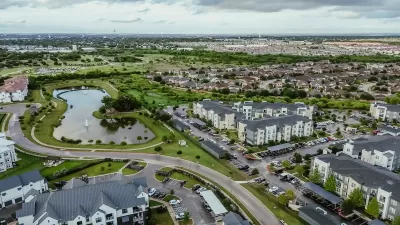All of the nation's largest metro areas are experiencing sharp growth in costs and demand for rental housing, posing even more challenges for low-income renters.

Rent prices, along with demand, are continuing to rise sharply in cities across the U.S. While markets like Phoenix and Boise have seen some of the sharpest spikes, writes Patrick Sisson, "[i]t’s a nationwide phenomenon that’s having a significant impact on housing markets, affordability and access."
All 100 of the nation's largest metro areas have experienced "month-over-month rent growth over the last five months, according to Apartment List economist Christopher Salviati," while Zillow data shows a national increase of 11.5% since last August. Unlike the residential housing market, which spiked early in the pandemic, says data journalist Jeff Andrews, "[t]he rental market is more of a slow matriculation. It takes a while for that backlog of renters to build up who should have cycled out of the market."
This growth coincides with the end of many eviction moratoriums and the end of expanded unemployment benefits. "Landlords are raising rents, and those getting back into the housing market have been shocked by the sharp increases from just a year ago." Meanwhile, "instability is rampant" and "[e]very open unit is flooded with multiple applications." Recipients of rental assistance vouchers are falling even further behind as higher-income renters enter the market and drive up demand.
"Today’s renters are impacted by the echo of the temporary but significant slowdown in new construction after the Great Recession. Those units, unbuilt due to a pause in construction, would have provided more slightly older and affordable options." Although multifamily construction is happening at a rapid pace, much of it caters to high-income renters.
"Salviati says that Apartment List data shows the vacancy rate slightly rising and growth rate slowing, so prices may stop accelerating at such a rapid clip, but there’s no indication prices will reverse, suggesting the affordability issues this rapid rent increase causes will be an ongoing concern."
FULL STORY: What’s Driving the Huge U.S. Rent Spike?

Planetizen Federal Action Tracker
A weekly monitor of how Trump’s orders and actions are impacting planners and planning in America.

Maui's Vacation Rental Debate Turns Ugly
Verbal attacks, misinformation campaigns and fistfights plague a high-stakes debate to convert thousands of vacation rentals into long-term housing.

Restaurant Patios Were a Pandemic Win — Why Were They so Hard to Keep?
Social distancing requirements and changes in travel patterns prompted cities to pilot new uses for street and sidewalk space. Then it got complicated.

In California Battle of Housing vs. Environment, Housing Just Won
A new state law significantly limits the power of CEQA, an environmental review law that served as a powerful tool for blocking new development.

Boulder Eliminates Parking Minimums Citywide
Officials estimate the cost of building a single underground parking space at up to $100,000.

Orange County, Florida Adopts Largest US “Sprawl Repair” Code
The ‘Orange Code’ seeks to rectify decades of sprawl-inducing, car-oriented development.
Urban Design for Planners 1: Software Tools
This six-course series explores essential urban design concepts using open source software and equips planners with the tools they need to participate fully in the urban design process.
Planning for Universal Design
Learn the tools for implementing Universal Design in planning regulations.
Heyer Gruel & Associates PA
JM Goldson LLC
Custer County Colorado
City of Camden Redevelopment Agency
City of Astoria
Transportation Research & Education Center (TREC) at Portland State University
Jefferson Parish Government
Camden Redevelopment Agency
City of Claremont





























